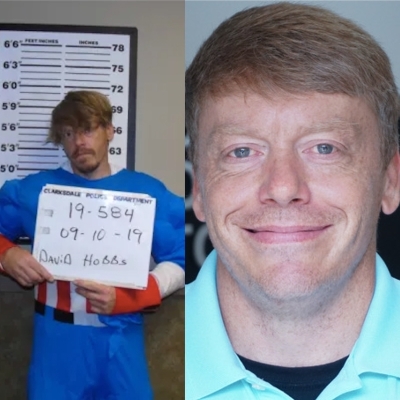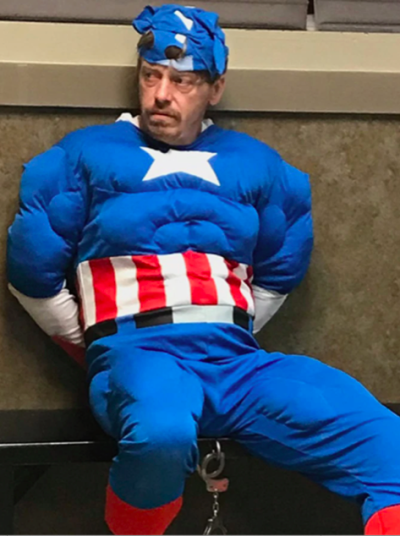Former drug addict arrested as Captain America during burglary shares story of faith, healing

When David Hobbs looks at pictures from one year ago, he barely recognizes himself.
In September 2019, he was arrested in Clarksdale, Mississippi, after breaking into the backyard shed of a former Marine. High on drugs at the time of his arrest, Hobbs was dressed head to toe in a Captain America costume and fairy wings. His mugshot went viral, and Hobbs quickly became the source of mockery for millions of social media spectators.
But fast forward one year, and Hobbs is a new man — healthy, whole, and on Oct. 23 he will receive a one-year sobriety award during an upcoming pastor's conference from Good Landing Recovery, a holistic faith-based organization in Atlanta, Georgia.
"I never thought I would ever get out of addiction,” Hobbs told The Christian Post. “I thought it was going to be my life. But God has shown me I’m not just a society throw away. It's all worth it for all of us to strive to have a better life. If I can do it, anybody can do it.”
Hobbs' road to health and healing was an unlikely one. A self-described “active addict” for two decades, he began experimenting with drugs and alcohol as a teen, and after a series of car accidents, became addicted to painkillers.
At the time of his September 2019 arrest, Hobbs had already had several run-ins with the law and was on probation for a grand larceny conviction. Charged with burglary and held on a $25,000 bond, he now faced even more jail time.
“I hit absolute rock bottom,” he admitted. “I believed I wasn’t good enough to get sober. I thought, ‘this is just the hand I’ve been dealt.’”
Hobbs' story captured the attention of Newsweek, Los Angeles Times, New York Post and other media, and eventually that of Good Landing founder and CEO Trey Lewis. But unlike the media outlets — all of which poked fun at the circumstances of his arrest — Lewis saw Hobbs' as a man worthy of receiving compassion, empathy, and freedom from addiction.
“A friend of mine sent me David’s story, and I recognized him immediately,” Lewis told CP. “We were from the same small town in Mississippi and used to get high together 20-some years ago.”
A former methamphetamine addict with four DUIs on his record, Lewis had been to 10 treatment centers before embracing Christianity in 2005. After experiencing freedom from addiction, he decided to open an inpatient residential treatment facility to help others struggling in the same way.
“So when I came across David’s story, I called his mother immediately and said, ‘We want to help him. If he’s interested, there’s a place for him in our facility,’” Lewis recalled. “As the entire world is laughing at David, he is in a jail cell and there's a mom that is talking to him every night, that is just horrified, embarrassed, and just can't believe that it's all over social media. It’s not funny when it’s attached to real people. It was heartbreaking.”
When faced with the opportunity to get help, Hobbs immediately accepted.
“I said, 'Absolutely. I would love to go,'” he said. “I didn't know what to expect. I'd never been to rehab before in my life; I'd never been sober in my life. But I wanted to get clean in my addiction, so when Trey reached out to my family and gave me the resources to get clean, I accepted. Thankfully, a judge agreed to allow me to participate in rehab instead of serving jail time."

The second Hobbs walked into Good Landing, he demonstrated “leadership, purpose, focus,” Lewis said, adding: “He had all of the ingredients for a remarkable comeback story.”
At Good Landing, Hobbs told CP he learned how to process emotions and feelings, overcome his battle with addiction — and, most importantly, renewed his relationship with God.
“God's timing is always perfect,” he said. “I don't think Good Landing is just any rehab; it’s a rehab where God's at the center of everything they do. That was the thing that really changed it for me. Putting God at the center of my heart and in the center of my life is really what kept me sober.”
Thirty days of sobriety turned into 60, and then 90, and eventually, 365. Receiving the one-year sobriety award, Hobbs said, was nothing short of remarkable.
“This award shows me how much I’ve grown,” he said. “Before, anytime something bad would happen or someone would say something negative about me, I always had the mindset that I would prove them right. I just figured, ‘Well, this is who I am. I’m an addict.’”
“But those are all lies," he added. "That's just what fear tells us. That's what the enemy tells us. But we all deserve a good, sober life and a good relationship with God. These are the things that I've been taught since I've been here at Good Landing.”
According to Lewis, there are 20 million addicts in the United States older than age 12, and there's typically a 20% success rate and an 80% failure rate.
“The 80% failure rate is typically attributed to the common denominator of pride,” he shared. “People know that they that they need help, but they always want to circumvent the process.”
When Good Landing opened in November 2017, the facility had just one client and two staff members. Today, it’s the largest PHP IOP program in Atlanta with 90-95 clients and over 40 staff members.
Lewis believes Good Landing's commitment to keeping Christ at the center of the ministry is the key to the facility's success.
“When we decided to start Good Landing, people were telling us we couldn’t have a faith-driven Christian program and health care, that people wouldn’t respond to it,” he said. “I remember really wavering on that. But Jesus is at the forefront of everything that we are. I believe God breathed on it and took us to where we are today.”
“Jesus,” he stressed, “is the only way out of addiction. He’s the only one who can bring freedom in this life and in the life to come.”
Treating those struggling with addiction with empathy, kindness, and compassion is crucial, Lewis said, stressing that no one “answered an altar call and said, 'God, please make me an addict.'”
“I don't think there is just this textbook type approach to every person, but I do think that we all need to have empathy and realize that this person did not ask for disordered brain chemistry,” he said.
“We need to realize that, once they get addicted, they forfeit the ability to be able to choose. That's when we, the people that love them, their support system, have to step in and fight for them and love them when they won't love themselves.”
Addiction and recovery are not just medical issues; they’re spiritual issues, too, he said. Unfortunately, many churches and church leaders aren’t aware of the magnitude of the problem — or they’re simply ill-equipped to help those struggling.
“Churches need to be informed and know they’re sending their people to a safe place where Jesus is at the forefront,” Lewis emphasized.
Today, Hobbs is on staff at Good Landing where he reminds others struggling with addiction that no one is beyond redemption. “He’s absolutely killing it here,” Lewis said.
“It doesn't matter how far you have fallen, there's always a path of sobriety and redemption,” Hobbs said. “You just have to be willing to get clean and have an open heart and mind to the people that are speaking into your life. Getting sober and changing your life is possible. You’re never too far gone.”



























